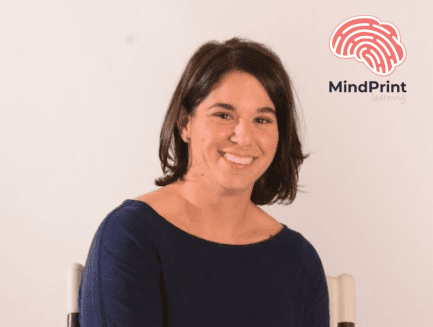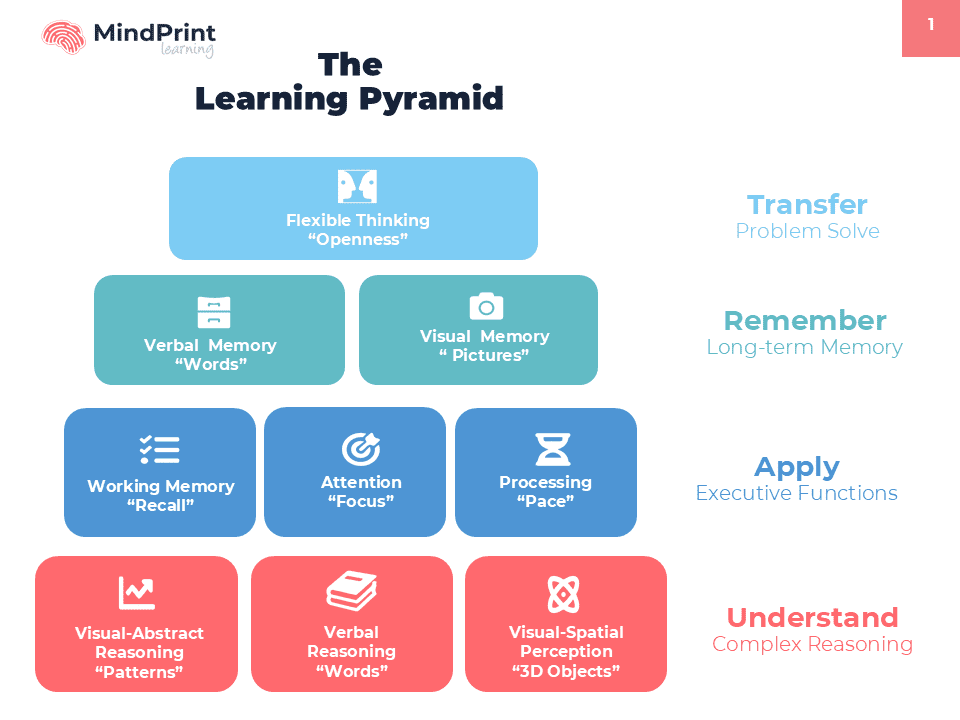Our Expert

Nancy Weinstein
CEO of MindPrint
Nancy Weinstein is the Founder and CEO of MindPrint Learning, specializing in using cognitive science to improve student outcomes. A national speaker and co-author of The Empowered Student, she is dedicated to helping students build self-awareness and confidence through personalized learning strategies.
Table of Contents
The Power of Self-Awareness in Learning
Many students struggle in school—not because they aren’t capable, but because they don’t yet understand how they learn best. This can lead to frustration, avoidance, or a lack of confidence.
As a parent, you may wonder: How can I help my child build confidence and self-awareness?
Helping children gain insight into how their brain works—their strengths, challenges, and learning style—is one of the most effective ways to improve both academic outcomes and emotional well-being.
Every student learns differently, but many struggle to articulate why certain subjects come naturally while others feel overwhelming. Research suggests that this discrepancy often stems from cognitive variability—differences in memory, reasoning, and executive function that shape how individuals process information.
A report from the RAND Corporation highlights that personalized learning approaches can lead to significant gains in student achievement, particularly when implemented with strong instructional support.
As Nancy Weinstein, CEO of MindPrint, explains, “Our hope is that we can support you in building that kind of self-confidence in all students because personalized learning and self-confidence are precursors to a student’s success.”
Understanding how students learn best is not just beneficial—it’s essential. By identifying individual cognitive strengths and challenges, educators and parents can create learning environments that foster engagement and resilience.
This article explores the science behind personalized learning, the role of self-awareness in academic success, and how these are integral pieces that help students build confidence and develop strategies that work best for them.
Building Self-Confidence Through Learning Strategies
Self-confidence plays a crucial role in academic success. Students often develop limiting beliefs, such as “I’m just bad at math.” However, research shows that personalized strategies help students overcome these mental barriers.
A study published in the Proceedings of the National Academy of Sciences found that students who were taught a growth mindset showed increased motivation and higher academic performance.
Carol Dweck’s growth mindset theory emphasizes that intelligence and skills can improve through effort, effective strategies, and guidance.
Nancy reinforced this point: “If we tell students they have needs and that a skill isn’t as strong, isn’t that going to hurt their confidence? No. Because when we show them how to succeed and build the necessary skills, they believe in their ability to grow.”
Why Some Kids Struggle (and How They Learn Best)
The Learning Pyramid is a model that helps tutors and students understand how learning occurs at different levels by breaking down cognitive processing into structured categories. It illustrates how different skills—such as understanding, memory, and flexible thinking—work together to shape a student’s ability to learn effectively.
As Nancy explained, by recognizing where a student excels and where they struggle within this framework, educators can develop targeted strategies to improve comprehension and retention.
- Understand (Complex Reasoning) – The foundation of learning, incorporating visual-abstract reasoning (patterns), verbal reasoning (words), and visual-spatial perception (3D objects).
- Apply (Executive Functions) – Includes working memory (recall), attention (focus), and processing speed (pace), which are critical for completing tasks.
- Remember (Long-Term Memory) – Covers verbal memory (words) and visual memory (pictures), essential for retaining and retrieving information.
- Transfer (Problem-Solving & Flexible Thinking) – Encourages students to connect knowledge across different contexts and adapt to new learning situations.

Research supports the effectiveness of personalized learning, showing that customized instruction improves academic performance and student motivation. A recent study published in ScienceDirect highlights the impact of personalized adaptive learning on student engagement and achievement, emphasizing how tailored instruction enhances retention and confidence in learning.
As Nancy noted, “If we can help students recognize how they learn best, they will be more engaged, happier, and ultimately more successful.” This is exactly why Tutor Doctor leverages the MindPrint assessment—to provide tutors with the insights they need to understand each student’s unique learning profile and implement personalized learning strategies that support long-term student success.
Practical Steps for Parents and Tutors to Support Self-Confidence
Supporting a child’s confidence isn’t about pushing them harder—it’s about helping them better understand themselves. This requires a combined effort from both parents and tutors. When students understand their strengths and challenges, they can take ownership of their learning and develop the confidence needed to succeed.
By fostering a growth mindset and implementing personalized strategies, parents and tutors play a crucial role in helping students reach their full potential.
| For Parents | For Tutors |
| Foster a growth mindset by praising effort and strategy over natural ability. | Use MindPrint assessments to tailor lesson plans to each student’s strengths. |
| Help students reflect on their strengths and apply them to challenging subjects. | Provide specific, constructive feedback that helps students build self-awareness. |
| Normalize setbacks as part of the learning process. | Encourage students to reflect on their learning styles and adopt personalized strategies. |
As Nancy emphasized, “Students who understand their own strengths will be more confident, more engaged, and more likely to succeed.”
What the MindPrint Assessment Reveals About Your Child
MindPrint assessments provide data-driven insights into cognitive strengths and weaknesses. Rather than focusing solely on test scores, this approach identifies how a student learns best. For example, Nancy explained:
- A student with strong verbal reasoning but weak visual memory may struggle with math but excel in writing-based subjects.
- A student who processes patterns well but has weak executive functioning may need structured support to stay organized and complete assignments.
“MindPrint allows us to say, ‘Are they best with patterns, words, or objects?’ That’s how you introduce new concepts and content to them,” Nancy said. This level of personalization ensures students receive the support they need based on their unique learning profile.
How Tutor Doctor and MindPrint Help Build Confidence
Once students understand how they learn, they begin to feel more confident and in control. That’s where the combination of insights from a MindPrint assessment and support from a personalized tutoring plan with Tutor Doctor makes a real difference.
By combining the expertise of our tutors with MindPrint’s cognitive assessment insights, students can gain a clear understanding of their strengths and areas for growth. As Nancy explained, “Students don’t just become self-aware on their own. They need guidance—someone to say, ‘Here’s what you’re doing, here’s how you can grow, and here’s what works for you.’ That’s how they develop the confidence to take control of their learning.”
Here are some of the key ways personalized tutoring with Tutor Doctor and insights from MindPrint foster self-confidence and academic success:
- Identifies strengths so students can leverage them in learning, ensuring instruction is tailored to their natural abilities for better comprehension and engagement.
- Pinpoints challenges and provides actionable strategies for improvement, helping create customized learning plans that address specific areas of difficulty.
- Encourages self-awareness so students can recognize what works best for them, fostering independent learning and stronger problem-solving skills.
- Creates a structured support system that ensures students receive consistent, customized instruction, reinforcing confidence and long-term success.
By aligning tutoring strategies with a student’s strengths and providing targeted feedback, Tutor Doctor and MindPrint work together to help students experience small successes that build their confidence over time.
Key Takeaways
- Self-awareness is a foundation for student success.
- MindPrint assessments provide data-driven insights into learning styles, which becomes valuable for effective, personalized tutoring.
- Personalized strategies help students overcome learning barriers.
- Building confidence through small wins fosters lifelong learning.
- Parents and tutors can work together to develop a growth mindset in students.
Empowering Students for Long-Term Success
Understanding how a student learns best is crucial to their success. Tutor Doctor’s partnership with MindPrint provides an innovative approach to learning, allowing students to develop self-awareness, confidence, and personalized learning strategies that drive long-term achievement.
If your child struggles with learning, Tutor Doctor can help identify their strengths and tailor strategies to support their success.




